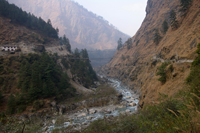- Home
- News
- Features
- Topics
- Labor
- Management
- Opinions/Blogs
- Tools & Resources
Nepal Aims To Hold Outsourcing Firms Accountable For Expats
Nepal, home to the earth’s highest mountain, is also home to some of the earth’s deepest unemployment and poverty rates, forcing millions of Nepalese to seek work abroad.

Mt. Everest
The government of Nepal has introduced the Foreign Employment Policy promoting safe and inclusive migration for the nation’s expatriate workers, according to a report from the Himalayan News Service.
Nepal Workers Migrate
Mass migration of Nepal’s workers began in 1991 when a constitutional monarchy was established and private companies began to recruit them for work abroad.
Today, about 1,100 Nepalis leave the country per day in search of work abroad. The go mostly in India and the Persian Gulf states — Qatar, Saudi Arabia, the United Arab Emirates, Kuwait, Bahrain and Oman as well as Malaysia.
Home to Mt. Everest and bordered by China and India, Nepal’s population is about 30 million. About 25% of Nepal’s population lives below the international poverty line of US$1.25 a day, a relative improvement from 41.2% in 1995.
The Nepalese workforce numbers about 10 million, lacks skilled labor, and the unemployment and underemployment rate approaches half the working-age population.
Despite recent efforts to create more jobs at home, Nepal must still rely on remittances, money sent home from Nepalese workers abroad. Nepali citizens working abroad send home around US$1 billion annually, including money

The Kaligandaki ghasa gorge in Nepal.
sent from the Persian Gulf states and Malaysia, which employ around 700,000 Nepalese.
Nepal also receives about US$50 million from Gurkha soldiers serving in the Indian and British armies.
An estimated 3.5 million Nepalese, work in 108 countries, but just 2.2 million are considered documented by Nepal’s Department of Foreign Employment. The missing 1.3 million are undocumented or illegal migrant Nepalese workers scattered around the world.
The new policy has focused on two parts — promoting safe migration and utilizing remittance money to create jobs within Nepal.
“Use of remittance in the productive sector will ultimately create jobs in the country,” said of the Ministry of Labour and Transport Management Buddhi Bahadur Khadka spokesperson told the Himalayan News Service.
“Our aim is to ultimately stop the migration of workers by creating jobs in the country.”
Trekkers and tourists bring money and create some jobs, but growth in the tourism and the hospitality industry has slowed due to recent political events.
A constitutional monarchy since 1991, in a peace 2006 deal with Communist rebels led to the abdication of Nepal’s king. In August 2011, Maoist Dr. Babu Ram Bhattarai became Nepal’s third Prime Minister, and the country celebrated Nepal Tourism Year.
The policy is aimed at holding outsourcing agencies or their agents responsible for migrant Nepalese workers.
“Safe migration is not possible without making outsourcing agencies accountable, so the policy has a major focus on it,” he said. The Department of Foreign Employment in Nepal is investigating fraudulent outsourcers using laws governing human trafficking, according to the report.
The policy plans to use diplomatic missions to safeguard the rights of Nepali migrant workers. “The government also wants to establish labor desks in destination countries,” said Khadka.
See also:
The World Wants A Job And Is Willing Migrate To Find One
By The Numbers – Global Worker Migration Trends
List your business in the premium web directory for free This website is listed under Human Resources Directory




